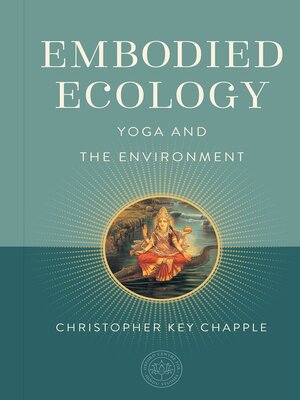Embodied Ecology
ebook ∣ Yoga and the Environment · The Oxford Centre for Hindu Studies Mandala Publishing Series
By Christopher Key Chapple

Sign up to save your library
With an OverDrive account, you can save your favorite libraries for at-a-glance information about availability. Find out more about OverDrive accounts.
Find this title in Libby, the library reading app by OverDrive.



Search for a digital library with this title
Title found at these libraries:
| Library Name | Distance |
|---|---|
| Loading... |
In this book, scholar of Indic religions Christopher Key Chapple explores how resources from the Hindu and Yoga traditions can inform contemporary conversations about the problems of environmental degradation, both in India and globally.
The world finds itself in an existential crisis. Climate chaos abounds. Pollution vitiates soil, water, and food. Anxiety and depression press upon human psyches, young and old. Embodied Ecology explores how core ideas and practices of Hinduism and Yoga might help provide hope and help in these troubled times.
The Vedas and early Upanisads signal the centrality of Earth-awareness in early India. The ethics of Yoga provide guidelines for developing a healthy relationship with the modern ills of over-consumption. Meditation practices as described in the Yoga-vasistha help develop a sense of intimacy with one's body, with other persons, and with the larger ecosphere. In the modern period, Mahatma Gandhi initiated a thoroughgoing economic critique that helped inspire India's many contemporary eco-activists including Vandana Shiva, M.C. Mehta, the late Anil Agarwal, and Sunderlal Bahuguna as well as communities including Govardhan Ecovillage and Bija Vidyapeeth.
Traversing these topics, Embodied Ecology seeks to discern how Hindu and Yoga ideals can address the pressing problems of global consumerism, the proliferation of plastic waste, species extinctions, and global climate change. It points toward the ways these rich traditions offer resources for fostering much-needed healing, inner and outer.
The world finds itself in an existential crisis. Climate chaos abounds. Pollution vitiates soil, water, and food. Anxiety and depression press upon human psyches, young and old. Embodied Ecology explores how core ideas and practices of Hinduism and Yoga might help provide hope and help in these troubled times.
The Vedas and early Upanisads signal the centrality of Earth-awareness in early India. The ethics of Yoga provide guidelines for developing a healthy relationship with the modern ills of over-consumption. Meditation practices as described in the Yoga-vasistha help develop a sense of intimacy with one's body, with other persons, and with the larger ecosphere. In the modern period, Mahatma Gandhi initiated a thoroughgoing economic critique that helped inspire India's many contemporary eco-activists including Vandana Shiva, M.C. Mehta, the late Anil Agarwal, and Sunderlal Bahuguna as well as communities including Govardhan Ecovillage and Bija Vidyapeeth.
Traversing these topics, Embodied Ecology seeks to discern how Hindu and Yoga ideals can address the pressing problems of global consumerism, the proliferation of plastic waste, species extinctions, and global climate change. It points toward the ways these rich traditions offer resources for fostering much-needed healing, inner and outer.







